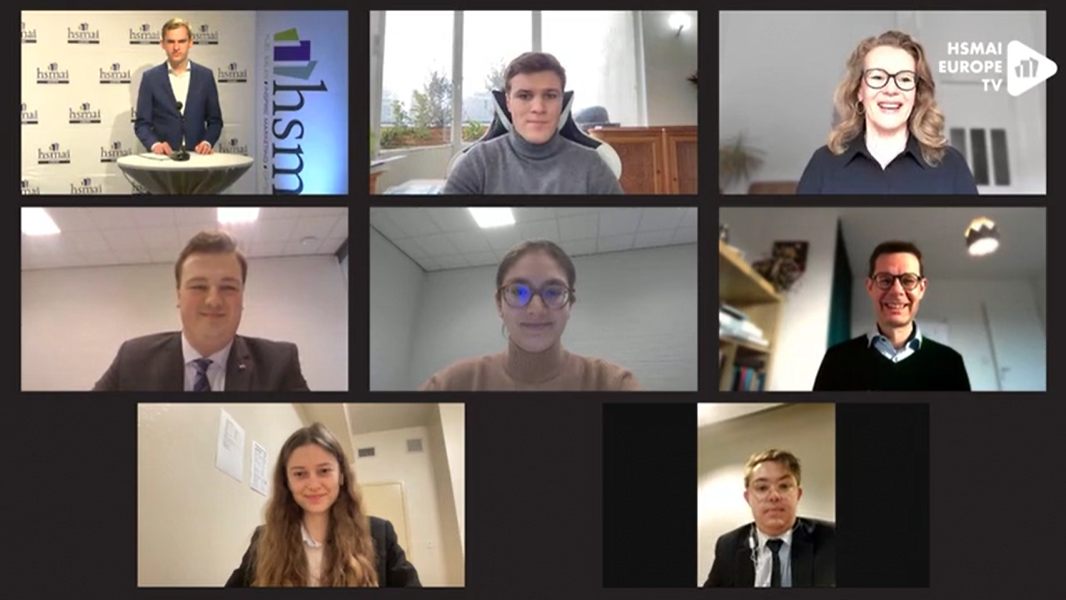Let’s Talk HR – An interview with Michael Wierling
Before our discussion with the students, Terence Baker, Senior Reporter, Europe for Hotel News Now, interviewed Michael Wierling on his thoughts regarding the retention of future talent in the industry. Michael Wierling recently joined the HSMAI Europe People & Culture Advisory Board and is the Director HR, Northern & Southern Europe at IHG Hotels & Resorts.

Terence Baker
Senior Reporter, Europe
Hotel News Now

Michael Wierling
Director HR, Northern & Southern Europe
IHG Hotels & Resorts
Michael’s advice for those looking to enter the industry or remain in it
“Anyone working in the industry needs to be clear that it’s all about service. We are creating experiences for guests, and if that’s not fuelling you with energy and pride, you need to be honest if this is for you. Even GMs need to understand how (stressful) it is working on the floor and serving guests. So, this doesn’t mean everyone needs to start ‘at the bottom’ but certainly they need the soft skills.
“Secondly, the industry is all about we, not I. It’s an industry that gives as much as it takes, and where colleagues chose to work and stay because of the camaraderie, the teamwork and the culture. It’s not a place that produces stars, it’s a place that produces team players.”
How the industry can attract talent
“At IHG we launched an initiative called myFlex in some markets, to give colleagues complete freedom to work when they want and pick shifts of preference. That’s directly trying to attack the current perception around the industry’s stiff working hours and shifts.
“There are a whole range of new initiatives and benefits the hospitality companies offer, from more flexible working to more modern benefits, to even free days off for volunteering activities. And companies continue to push boundaries.”
Why the industry needs to be proud of what it offers – but we need to market ourselves better and tell the story
“A few years ago, I visited the Facebook campus and had a tour with a family member working there to explore what makes them such a great place to work. I came back realising that in hospitality we offer almost all of these benefits, but we just don’t seem to market them well enough or aren’t so consistent at using them.
“Still, if you look at the best employer rankings, hospitality companies are among the top employers, and for a reason. More than ever, we compete for talent with other industries. The industry will become more competitive in what it offers.”
Terry:
Hotels traditionally have had staff work across all silos, but has the pandemic changed that, and if so how? What has been lost and gained?
Michael:
You are right, while there are few who operate differently, the majority of hotels have worked with long established set ups, from org charts to positions to the way we incentivise, recognise and reward colleagues in hotels.
This has also shaped the culture of many hotels, something Emile just mentioned sits at the core of the things we must change moving forward.
I guess the need for change was already obvious for a long time, and many hotel companies have started to break up the way we work, however insufficiently. That especially so for younger generations who we know like to challenge the status quo, and demand for modern places to work, with a purpose.
No doubt the Covid pandemic has disrupted our industry, and accelerated change. Flexible working policies and working from home arrangements like we luckily introduced at IHG already at the end 2019 have become more commonplace.
In that sense, we have gained new practices that I believe will resonate not only with the younger generation for more flexibility, but also new talent pools.
We certainly also lost something, but that’s a good thing: we no longer can afford working in those departmental silos or departments. Across many hotels we see departments and teams merge, simply for pragmatic reasons to give all colleagues an equal opportunity to take up shifts during lower occupancy, and where colleagues may need to isolate. We even see this in sports these days, if the A players are all in isolation, the bench players get their chance to shine. That’s a good thing for young talent to take up early leadership opportunities now
Needless to say, all colleagues in a hotel work hand in hand, everyone supports when hands are needed, be it front or back of house. I find this makes the difference between hospitality and other industries where often everyone is in their own department. With hospitality, even marketing or HR colleagues sometimes roll up their sleeves to make beds and help out with an important banquet function. It’s team work. At IHG we call it True Hospitality for everyone. I think this teamship and the culture is the constant in this, and something that’s unique and resonates with generations to come.
Terry:
Staffing is an acute problem for hotels? Has working with fewer staff meant an overhaul of training and staffing?
Michael:
Let’s face it, the pandemic presented a difficult ultimatum to hotels: reduce team size in the short term to survive financially, or keep the team on board but maybe with significant sacrifices to sustain operational momentum in the mid and long term.
None of us had a perfect crystal ball to know when travel will resume. Hotels have taken careful steps to retain colleagues where we could, however often that meant being very conscious on cost: no salary increases, no bonuses. That remains a challenge for the industry. Many colleagues therefore also left the industry for better paid jobs
In the mid and long run we know travel will return, and therefore the industry will offer huge career opportunities. I am confident we will be seen as attractive workplaces again soon, but in the here and now many hotels find it difficult to fill positions, not only because the industry is seen as less stable for job security but also because borders are still restricting ease of access to work abroad. Many students are feeling the impact of this, being unable to find internship or trainee placements currently. That’s what is really hurting us all, not being able to offer the current generation of hoteliers the experiences they need for their career to start.
All this meant we had to find different ways of working inside a hotel, but we also have seen many more services being delivered to hotels virtually. In the crisis the demand for training online has surged, and so many companies have started to offer courses and training, and a lot of new content on wellbeing for example, free of charge and more accessible online.
IHG for example has launched the IHG Skills Academy, a platform that provides hospitality training free of charge to anyone, primarily targeting people around the world who are unable to access or afford education. This sits in IHG’s Journey to Tomorrow commitment to improve the lives of 30 million people in the coming years.
Hotel companies provide a great deal of training and development these days, and certainly the trend goes to provide a lot of it virtual, especially where you no longer get all learners together in a class-room – even more so for social distancing rules but also pragmatically. Even hotels’ morning briefings are often now online.
Almost all of IHG’s courses are now virtually instructor-led and/or self-paced in digital form- something our L&D teams have had to react quickly to.
I believe that’s a good thing that will resonate with the young generation of hoteliers who are used to have learning content available on the switch of a button, wherever you are.
All that said, people still want to work with, and see others in person, be it at work, in training or for travel, so I remain confident for the future that learning will also happen in the form of conferences and events, something we absolutely want and need as an industry, of course.
Terry:
How would you encourage new employees to enter the industry, in the face of young people seemingly saying they do not want to work strange hours, start at the bottom, &c., all things the hotel industry prides itself on in terms of producing after a number of years learning with several departments complete hoteliers with excellent, meaningful careers
Michael:
No doubt the industry has some strong parameters and stigmas – some of which we just spoke about
I’d say two things initially to this
First, anyone working in the industry needs to be clear that it’s all about service. We are creating experiences for guests, and if that’s not fuelling you with energy and pride be honest if this is for you. Even GMs need to understand how (stressful) it is working on the floor and serving guests. So, this doesn’t mean everyone needs to start ‘at the bottom’ but certainly needs the soft skills Emile talked about earlier, and the understanding
Second, the industry is all about we, not I. It’s an industry that gives as much as it takes, and where colleagues chose to work and stay because of the camaraderie, the teamship and the culture. It’s not a place that produces stars, it’s a place that produces team players.
Now to your question on how the industry looks to attract talent
There are some new practices hoteliers are starting.
At IHG for example we launched an initiative called myFlex in some markets, to give colleagues complete freedom to work when they want and pick shifts of preference. That’s directly trying to attack the perception of stiff working hours and shifts. We are trying this in mature markets and explore to expand this practice elsewhere.
Wellbeing is a big theme, especially promoted through the pandemic. This wasn’t something we often spoke about in the industry before. We now have launched a number of initiatives to help colleagues through stressful periods and get better at noticing and saying when they are not well, and we train colleagues to be mental health first aiders.
There are a whole range of new initiatives and benefits the hospitality companies offer, from more flexible working, to more modern benefits, to even free days off for volunteering activities. And companies continue to push boundaries.
A few years ago I visited the facebook campus and had a tour with a family member working there to explore what makes them such a great place to work. I came back realising that in hospitality we offer almost all of these benefits, but we just don’t seem to market them well enough, or aren’t so consistent at using them.
Still, if you look at the best employer rankings, Hospitality companies are among the top employers, and for a reason. We now more than ever compete for talent with different industries, and therefore will become more competitive in what we offer, but also in the way we organise work.
Thanks so much for giving me a chance to share my thoughts on this, Terry!



























